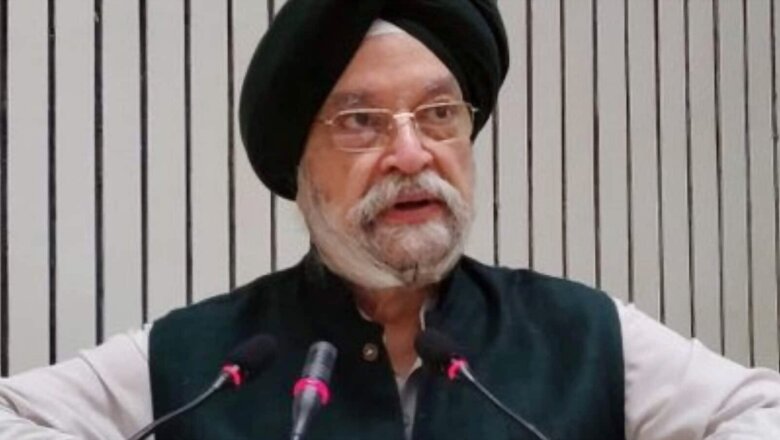
views
Union minister Hardeep Singh Puri, a bureaucrat-turned-politician, Saturday said he worked closely with former president APJ Abdul Kalam in the period running up to Pokhran-II tests, and ended up playing an “interpreter” during conversation between him and the then defence minister Mulayam Singh Yadav.
Puri, who served as a joint secretary in the Ministry of Defence between 1997 and 1999, Saturday paid tributes to the former president in his 3rd Dr. APJ Abdul Kalam memorial lecture at the Indian Islamic Cultural Centre here, saying he revolutionised India’s defence systems and national security. Kalam achieved great professional successes that helped shape the nation and chart its course in the 21st century, he said. At the same time, said the housing and urban affairs minister, Kalam’s personal story of integrity, intellect, and charm influenced the lives of so many Indians directly and indirectly.
Puri said that during his stint as a defence ministry joint secretary he had the privilege of working very closely with Kalam, who was then the scientific adviser to the government of India. That was an extremely pivotal period for India’s defence sector, he said.
“It was a period that would earn India a prominent place in the global geopolitical landscape, and would dictate our foreign policy in the new century.” During this time, the Central government was preparing for the Pokhran-II tests which were eventually conducted under the joint leadership of Kalam in May 1998, Puri recalled. “Of the many hats I have had to wear in my life as a civil and public servant, the experience of working in the Ministry of Defence with Dr. Kalam was a highlight,” he said.
Puri said he still remembers the clarity of leadership that Kalam brought to the table, and how deftly he handled stakeholders from the political, scientific, and administrative streams in making that ‘Operation Shakti’, as the Pokhran operation was called, a success. “On a lighter note, I can freely admit to playing a small role in facilitating the discussion at that point of time. I ended up, when I joined as a joint secretary of policy and coordination, as the interpreter in Shri Mulayam Singh Yadav’s morning meetings. “He used to take a meeting on every Monday morning which used to bring in the service chiefs, cabinet secretary, principal secretary to the prime minister and of course Dr. Kalam and the defence secretary,” he said.
“If Mulayam Singh ji and Dr Kalam were in a room, I am sure that they would have a great conversation. But the fact was that Dr. Kalam spoke no Hindi and Mulayam Singh ji, I am sure, he spoke very good English, but he used to choose Hindi in return,” he said. The Samajwadi Party patriarch was the defence minister till March, 1998 and, thereafter, senior leader George Fernandes had succeeded him.
“But jokes aside, I am certain that I do not overstate it when I say that Dr. Kalam revolutionised India’s defence systems and national security,” Puri said The minister said he cannot think of many others in the country who have received the admiration, respect, and love that Kalam has deservedly received, and continues to receive even today. “He represented the multitudes that encompass the diversity of this great nation he was a devout Muslim, but he was also deeply spiritual, and promoted inter-faith dialogue and syncretism. He was a visionary scientist who developed cutting-edge satellite technology but also advocated for development in rural areas,” he said.
Puri said Kalam was India’s ‘Missile Man’ who enhanced India’s space and defence capabilities, but also dedicated his life towards furthering peace. The 11th May being celebrated as the ‘National Technology Day’ is a testament to what the Pokhran-II tests did to direct the public consciousness towards the role of technology in the future of the country, he also said, adding Kalam was instrumental in unshackling the defence sector. Kalam strongly endorsed increasing India’s self-sufficiency in important aspects of nation-building and laid out this vision in his ‘India 2020’ roadmap which identified five areas where India had to build core competencies, he said.
The Union housing and urban affairs minister said he was glad to say that the country has come a long way on the roadmap that Kalam had laid out for India. “Whether it is infrastructure creation or national security; education or space exploration, the Government of India, under the leadership of Prime Minister Narendra Modi, is on the path towards self-reliance and sustainable economic growth which is going to position India as a superpower,” Puri added.
Read all the Latest News , Breaking News and IPL 2022 Live Updates here.




















Comments
0 comment